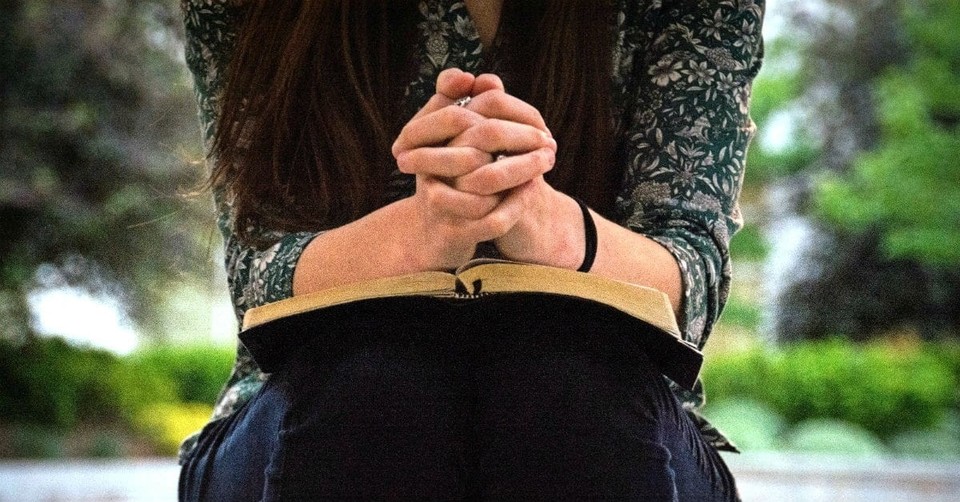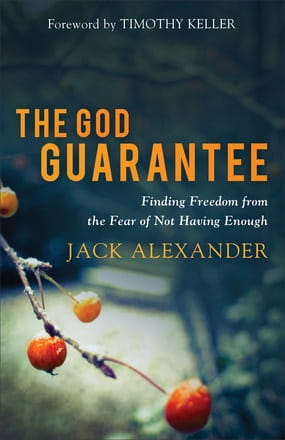Where Do You Put Your Faith?

As Christians, we are aware of specific things that are simply part of the faith. Most of us know the Bible calls us to tithe. We also probably know we should volunteer our time at a food bank or at our church. And one Sunday when our children are small, we dress them up and bring them to church because tradition dictates we should christen or dedicate them.
We act in obedience, but sometimes we are just hedging our bets against the things we know we can’t control. We check the boxes of what God “expects” and think, Surely that’s enough. In these uncertain times, God can’t ask for more than that. So we go back to our regular lives, with all the day-to-day stresses and unanswered questions about the future. We put our faith in what we can see—our bank accounts, our work ethic, our government, our families. We push aside the needs of others, thinking government services, disaster relief funds, and other people will solve those problems. We have too much on our plates already as we try to control everything around us, worrying about the future.
Like the disciples, we doubt what we cannot see. We fear what we cannot control.
And that’s just the way the enemy wants it. In the spiritual war that rages around us, fear is one of Satan’s greatest weapons. He uses fearful thinking to drive unbelief, creating a wedge between our human interpretations and God’s divine and holy provision. He dissuades us from sacrifice, whispering that God doesn’t really care about our day-to-day lives. He blocks us from receiving the fullness of God’s blessing by focusing our attention on other things—on idols.
One of my favorite verses is Jonah 2:8–9: “Those who cling to worthless idols turn away from God’s love for them. But I, with shouts of grateful praise, will sacrifice to you. What I have vowed I will make good.”
This was a hard-learned lesson for the prophet Jonah, whom my mother used to quiz me about many years ago. God had called him to preach to the Assyrian people of Nineveh, longtime enemies of the Israelites. Jonah didn’t want to go. He tried to run away instead, jumping on a boat that was going anywhere except to the place where God had called him. But God sent a storm that tossed the boat and threatened the lives of everyone on board. Knowing this was his punishment, Jonah told the sailors to throw him overboard to save their own lives. They did, and a “huge fish” swallowed Jonah, saving his life but putting him in an uncomfortable position. After three days of surviving inside the fish, Jonah came to his senses and called out to the Lord for help.
When we put anything ahead of God in our hearts—even our own safety, as Jonah did—we turn our backs on God’s love and forfeit our place in his provision. Imagine choosing to forfeit “amazing grace” to cling to a false god. By surrendering these idols, we open up space in our lives to receive God’s mercy and grace.
Idols are the things we feel are too important to give to God. They are, even when we know better than to use the words, the things that are more important to us than God.
The enemy knows our weak spots. He knows we want to protect our children, to provide for our families, to not be a burden. He tells us our first priority must be our own comfort and security, especially in indigent and uncertain times. Satan preys on our fears and convinces us we must rely on ourselves to secure our situation.
The tentacles of disbelief slide into our faith, weakening it, and we start to trust our bank accounts more than the One who gave them to us. Will a consecrated dollar or person or decision really be different from one that’s not consecrated?
I want to be clear: money, in itself, is not wrong. It is a necessary and useful commodity to keep the practical systems running smoothly. Moreover, wealth in and of itself is not condemned in the Bible. Several figures in the Old and New Testaments are noted, without negative judgment, as being wealthy: Abraham, Jacob, Job, King David, Joseph of Arimathea, Philemon, and Aquila and Priscilla.
However, making money into an idol and turning to it instead of to God leads us into Satan’s trap and away from God’s best plan for us. God—not money—is our provider. Often the test as to whether money has become an idol is the extent to which we are willing to risk it for God’s kingdom.
We can rely on God or money but not on both. At times, you may feel you have everything under control, that you are being a wise steward of your resources. But if the economy has taught us anything in the past decade, it’s that we can rely on nothing on this earth. In Proverbs 23:5, we’re told that riches can “sprout wings and fly off to the sky like an eagle.” Jeremiah 48 and 49 warn of the downfall of various nations due to the ways they trusted in and boasted of their riches, being arrogant in their wealth. Our houses—or at least the value of our houses—might crumble. The savings we tucked away in the bank, counting on them to be safe for the future, can be taken from us. Human promises of provision might be rescinded.
The idol of money is a counterfeit source of provision and safety. It seems to meet our needs for a season, but in the end—whether we have a million dollars or a pile of debt—it will enslave us and leave us desperate.
Only God will never fail. Only he can be trusted to protect and use what is his.
Everything we have is his.

Jack Alexander has built and led companies in real estate, business services, and technology. Two companies that he cofounded made the Inc. 500 list, and another, in which he is a partner, made the Inc. 5000 list. He is currently chairman and cofounder of a software firm called Understory, as well as for The Reimagine Group, a content company that makes high-quality media for the church market. A previous recipient of the Ernst & Young National Entrepreneur of the Year award, Alexander is also winner of six global awards in the corporate travel and hospitality arena. In 2005, he received the Family Honors Award as a businessman who made a positive impact on the American family. He is a regular speaker, coach, and board member for a number of businesses, nonprofits, and ministries. Jack lives in Atlanta, Georgia, with his wife, Lisa. They have three grown sons and three grandsons.
Image courtesy: Unsplash.com
Publication date: August 25, 2017
Originally published August 25, 2017.





